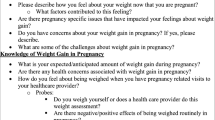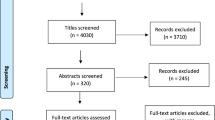Abstract
Overweight and obesity during pregnancy is associated with risk of a range of adverse health outcomes. While intervention studies aim to promote behavioral change, little is known about the underlying psychological mechanisms facilitating and hindering change. The aim of this study was to evaluate overweight and obese women’s perceptions of making behavior change during pregnancy. We explored beliefs through self-administrated questionnaires (n = 464) and semi-structured face-to-face interviews (n = 26). Questions were designed according to the Health Belief Model. A triangulation protocol was followed to combine quantitative and qualitative data. A total of 269 women (58 %) indicated that high gestational weight gain is a concern, with 348 (75 %) indicating excessive weight gain is associated with complications during pregnancy or child birth. Women were aware of maternal complications associated with high gestational weight gain, but had more limited awareness of neonatal complications. While most women indicated in questionnaires that healthy eating and physical activity were associated with improved health during pregnancy, they were unable to identify specific benefits at interview. Barriers to making healthy behavior changes were highly individualized, the main barrier being lack of time. While the majority (91 %) of women indicated that they would make behavior changes if the change made them feel better, only half felt confident in their ability to do so. Interventions for overweight and obese pregnant women should incorporate education about neonatal health consequences and benefits of healthy behavior change in addition to incorporating strategies to enhance self-efficacy.
Similar content being viewed by others
References
Vahratian, A. (2009). Prevalence of overweight and obesity among women of childbearing age: Results from the 2002 National Survey of Family Growth. Maternal and Child Health Journal, 13(2), 268–273.
Callaway, L. K., Prins, J. B., Chang, A. M., & McIntyre, H. D. (2006). The prevalence and impact of overweight and obesity in an Australian obstetric population. Medical Journal of Australia, 184(2), 56–59.
Chan, A., Scheil, W., Scott, J., Nguyen, A. M., & Sage, L. (2011). Pregnancy outcome in South Australia 2009. In Pregnancy Outcome Unit SH (Ed) Adelaide: Government of South Australia.
Royal College of Obstetricians and Gynaecologist. (2006). The growing trends in maternal obesity. Royal College of Obstetricians and Gynaecologist (updated 05/10/2006; cited 2012 01/02/2012); Available from: http://www.rcog.org.uk/news/growing-trends-maternal-obesity.
Hedderson, M. M., Gunderson, E. P., & Ferrara, A. (2010). Gestational weight gain and risk of gestational diabetes mellitus. Obstetrics and Gynecology, 115(3), 597–604.
Catalano, P. M., & Ehrenberg, H. M. (2006). The short- and long-term implications of maternal obesity on the mother and her offspring. British Journal of Obstetrics and Gynaecology, 113(10), 1126–1133.
Pereira, L. (2009). Surgery in the obese pregnant patient. Clinical Obstetrics and Gynecology, 52(4), 546–556.
Dodd, J. M., Grivell, R. M., Nguyen, A. M., Chan, A., & Robinson, J. S. (2011). Maternal and perinatal health outcomes by body mass index category. Australian and New Zealand Journal of Obstetrics and Gynaecology, 51(2), 136–140.
Dodd, J. M., Grivell, R. M., Crowther, C. A., & Robinson, J. S. (2010). Antenatal interventions for overweight or obese pregnant women: a systematic review of randomised trials. British Journal of Obstetrics and Gynaecology, 117(11), 1316–1326.
Tanentsapf, I., Heitmann, B. L., & Adegboye, A. R. (2011). Systematic review of clinical trials on dietary interventions to prevent excessive weight gain during pregnancy among normal weight, overweight and obese women. BMC Pregnancy and Childbirth, 11(1), 81.
Sui, Z., Grivell, R. M., & Dodd, J. M. (2012). Antenatal exercise to improve outcomes in overweight or obese women: A systematic review. Acta Obstetricia et Gynecologica Scandinavica, 91(5), 538–545.
Streuling, I., Beyerlein, A., & von Kries, R. (2010). Can gestational weight gain be modified by increasing physical activity and diet counseling? A meta-analysis of interventional trials. American Journal of Clinical Nutrition, 92(4), 678–687.
Kominiarek, M. A., Vonderheid, S., & Endres, L. K. (2010). Maternal obesity: Do patients understand the risks? Journal of Perinatology, 30(7), 452–458.
Gardner, B., Wardle, J., Poston, L., & Croker, H. (2011). Changing diet and physical activity to reduce gestational weight gain: a meta-analysis. Obesity Reviews, 12(7), e602–e620.
Rimer, B. K., & Glanz, K. (2005). National Cancer Institute. Theory at a Glance—A guide for Health Promotion Practice: National Cancer Institute, Services USDoHaH.
Smith, D., & Lavender, T. (2011). The maternity experience for women with a body mass index≥30 kg/m2: A meta-synthesis. British Journal of Obstetrics and Gynaecology, 118(7), 779–789.
Tovar, A., Chasan-Taber, L., Bermudez, O. I., Hyatt, R. R., & Must, A. (2010). Knowledge, attitudes, and beliefs regarding weight gain during pregnancy among Hispanic women. Maternal and Child Health Journal, 14(6), 938–949.
Mills, A., Schmied, V. A., & Dahlen, H. G. (2011). ‘Get alongside us’, women’s experiences of being overweight and pregnant in Sydney, Australia. Maternal and Child Nutrition. doi:10.1111/j.1740-8709.2011.00386.x.
Farmer, T., Robinson, K., Elliott, S. J., & Eyles, J. (2006). Developing and implementing a triangulation protocol for qualitative health research. Qualitative Health Research, 16(3), 377–394.
O’Cathain, A., Murphy, E., & Nicholl, J. (2010). Three techniques for integrating data in mixed methods studies. British Medical Journal, 341, c4587.
Daddario, D. K. (2007). A review of the use of the health belief model for weight management. Medsurg Nursing, 16(6), 363–366.
Baranowski, T., Cullen, K. W., Nicklas, T., Thompson, D., & Baranowski, J. (2003). Are current health behavioral change models helpful in guiding prevention of weight gain efforts? Obesity Research, 11, 23–43.
Dodd, J. M., Turnbull, D. A., McPhee, A. J., Wittert, G., Crowther, C. A., & Robinson, J. S. (2011). Limiting weight gain in overweight and obese women during pregnancy to improve health outcomes: the LIMIT randomised controlled trial. BMC Pregnancy and Childbirth, 11, 79.
Anderson, E. S., Winett, R. A., & Wojcik, J. R. (2000). Social-cognitive determinants of nutrition behavior among supermarket food shoppers: A structural equation analysis. Health Psychology, 19(5), 479–486.
Markland, D. (1999). Self-Determination moderates the effects of perceived competence on intrinsic motivation in an exercise setting. Journal of Sport and Exercise Psychology, 21, 351–361.
Ryan, R. M., & Deci, E. L. (2000). Self-determination theory and the facilitation of intrinsic motivation, social development, and well-being. American Psychologist, 55(1), 68–78.
Sheldon, K., Ryan, R. M., & Reis, H. (1996). What makes for a good day? Personality and Social Psychology Bulletin, 22, 1270–1279.
Murray, S. A. (1999). Experiences with “rapid appraisal” in primary care: Involving the public in assessing health needs, orientating staff, and educating medical students. British Medical Journal, 318(7181), 440–444.
Strauss, A. L., & Corbin, J. M. (1990). Basics of qualitative research: Grounded theory procedures and techniques. Newbury Park, California: Sage Publications.
Ritchie, J., & Spencer, L. (1994). Qualitative data analysis for applied policy research. In A. Bryman & R. Burgess (Eds.), Analysing qualitative data (pp. 173–194). London: Routledge.
Pope, C., Ziebland, S., & Mays, N. (2000). Qualitative research in health care. Analysing qualitative data. British Medical Journal, 320(7227), 114–116.
Acknowledgments
We are thankful to the 464 women who participated in this study on which this manuscript is based. The LIMIT study is supported through a NHMRC project grant (ID 519240)
Conflict of interest
The authors have no conflict of interests to declare.
Author information
Authors and Affiliations
Corresponding author
Rights and permissions
About this article
Cite this article
Sui, Z., Turnbull, D.A. & Dodd, J.M. Overweight and Obese Women’s Perceptions About Making Healthy Change During Pregnancy: A Mixed Method Study. Matern Child Health J 17, 1879–1887 (2013). https://doi.org/10.1007/s10995-012-1211-8
Published:
Issue Date:
DOI: https://doi.org/10.1007/s10995-012-1211-8




